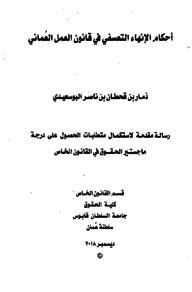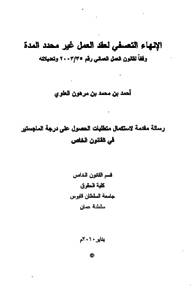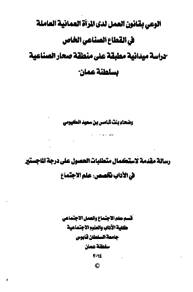Document
أحكام الإنهاء التعسفي في قانون العمل العماني
Publisher
جامعة السلطان قابوس
Gregorian
2018
Language
Arabic
Subject
English abstract
This study, entitled 'Provisions of Arbitrary Termination in the Omani Labor Law', is aimed at clarifying what is meant by 'arbitrary termination of the employment contract', the relationship between it and the theory of abuse of the right, and identifying the arbitrary termination of indefinite-term and fixed-term contracts in light of the provisions of the Oman Labor Law and other relevant laws.
The study consists of an introduction and two chapters. The introduction explains the concept, types of the employment contracts, the concept of arbitrary termination and its relation to the abuse of rights theory. In the first chapter, the researcher reviews the provisions of arbitrary termination of indefinite-term contract, while in the second chapter he reviews the provisions of the arbitrary termination of the fixed-term contract. The study concludes with main findings and recommendations.
The main findings include the following:
1. That the arbitrary termination of the employment contract could be described as the
termination made by either of the parties without a legitiinate cause or justification for doing so, and which might liarm the interests of the other party.
2. That the arbitrary termination of an employment contract is often associated with indefinite-term contracts and is closely linked to the abuse of the rights theory. Yet, the particularity of this type of contract makes the concept of arbitrariness of the termination of employment contract in need of legal assessment to apply it in regulating Labor Law provisions, as well as the role of the judiciary in addressing this phenomenon.
3. The Omani Labor Law allows the employee to terminate the indefinite-terin employment contract by resignation or due to a proven illness or disability. Yet, it does not compel the employee to disclose the reason for his desire to terminate the contract, but it obliges him to notify the employer and to adhere to the legal notice period.
4. The termination of the employment contract by the employee is considered to be arbitrary termination if the employee fails to notify the employer in time and fails to comply with the legal notice period. Thus, the responsibility of adhering to the legal notice period is the responsibility of the employee, whereas the responsibility of proving the non-adherence of the employee to the legal notice period is the responsibility of the employer.
5. The judiciary is the authority that has the power to estimate the compensation to which the employee is entitled when the termination by the employer is premature. But if the contract is terminated within the probation period, the judge estimates whether there should be compensation or not then estimates the amount of the compensation, if any, according to the period the employee has been on the job and other considerations related to the nature of the work itself and the wage which had
been agreed upon by the two parties.
6. The Omani legislator has decided that if the two parties continue implementing the contract without renewing it after its expiry, this should be considered an implicit renewal of the contract. Thus, the contract should be treated as an indefinite-term contract.
7. In light of Article (37) of the Omani Labor Law, both the employer and the employee have the right to terminate the indefinite-term contract individually according to the Article 43/4 that stipulates that the dismissal, resignation or leaving work are to be considered cases of terminating the contract, In order for such termination to be legal, there should be two fundamental criteria which are: prior notice and an acceptable justification.
The main recommendations of the study are:
1. Rephrasing the definition of the labor contract in Omani Labor Law along the same
lines as the Jordanian legislator, so that the definition includes all the important elements that are specific to the nature of the employment contract. These elements are: time, legal dependency and wages, which are neglected by the Egyptian and Omani legislators.
2. Circulating the cases stipulated in article (41) of the Omani Labor Law to both fixed
term and indefinite-term contracts. The cases provided for in the current version refer only to the fixed-term contracts. The purpose is to confirm the right of the employee to terminate the indefinite-term contract on his own will in case of the occurrence of any of the conditions stipulated in the Omani Labor Law. However, it would be
deemed an arbitrary termination if the contract is terminated by the employee without the occurrence of any of the stipulated conditions,
3. Adding an article along the lines of Article (120) of the Egyptian Labor Law to the Omani Labor Law. That is because this article sets a clearer scope for termination in terms of its legality and illegality. The Egyptian legislator has realized that the use of any of the justifications provided for in Article (120) may mainly deprive the employer from his stated rights or from his job for reasons beyond his control, or for legitimate conditions that might not justify the termination. The researcher therefore, recommends that the Omani legislator should follow the example of the Egyptian legislator and provide for such an article.
4. Adding an article along the lines of Article (39) of the UAE Labor Law, in which the
UAE legislator defined the cases in which the employment contract is indefinite, in order to put a lid on the disputes arising between the employers and employees about proving whether the contract is a fixed-term or indefinite-term contract.
5. Adding articles along the lines of Article (26) of the Jordanian Labor Law and Articles
(115) and (116) of the UAE Labor Law to the Omani Labor Law to define the appropriate amount of compensation in kind in the event of terminating a fixed-term contract by the concerned parties.
6. Article (106) should be amended to provide for a specific legal consequence in case of violation of the periods specified by the legislator in the mechanism of the proceedings of the suit filed by the employee against his dismissal, until the time of the verdict of the judiciary. As these periods are only organizational, it would have been better that the legislator had recommended a specific legal consequence in case of non-compliance with these periods in order to achieve the legislator's objective of such periods, namely, the quickness of the proceedings and passing of the judgment.
7. Article (106) should be amended to provide general and comprehensive compensation for all parties, by stating consequence for terminating a contract in an arbitrary and illegal manner, by any of the parties, specifying the percentage of compensation for the party affected by such termination.
8. Article (106) of the Omani Labor Law should be amended along the lines of Article (122) of the Egyptian Labor Law so that the amount of compensation for arbitrary termination or illegal termination of the contract should be linked explicitly to the years of service.
Member of
Resource URL
Arabic abstract
تهدف هذه الدراسة المعنونة ب أحكام الإنهاء التعسفي في قانون العمل العماني" إلى بيان المقصود بالإنهاء التعسفي في عقد العمل، والعلاقة بينه وبين نظرية التعسف في استعمال الحق، والتعرف على أساس الإنهاء التعسفي في عقد العمل مع ذكر حالاته، وبيان أحكام الإنهاء التعسفي في عقد العمل غير محدد المدة وعقد العمل محدد المدة، وذلك في ضوء أحكام ونصوص قانون العمل العماني والقوانين الأخرى ذات الصلة.
وقد تألفت الدراسة من مقدمة وفصلين، عنت المقدمة ببيان مفهوم عقد العمل وأنواعه، وبيان مفهوم الإنهاء التعسفي وعلاقته بنظرية التعسف في استعمال الحق، وفي الفصل الأول استعرض الباحث أحكام الإنهاء التعسفي في عقد العمل غير محدد المدة، في حين عني الفصل الثاني بأحكام الإنهاء التعسفي لعقد العمل محدد المدة، بالإضافة إلى خاتمة اشتملت على أبرز النتائج والتوصيات. من أهم نتائج الدراسة، ما يلي:
1- أن الإنهاء التعسفي لعقد العمل هو ذلك الإنهاء الذي يقوم به أحد طرفي عقد العمل للعقد دون وجود سبب أو مبرر مشروع لذلك، بما قد يترتب عنه الإضرار بمصالح الطرف الآخر.
2- أن الإنهاء التعسفي لعقد العمل غالبا ما يرتبط بعقود العمل غير محددة المدة، مرتبطة على نحو وثيق بنظرية التعسف في استعمال الحق، إلا أن خصوصية عقد العمل نفسه جعلت من مفهوم التعسف في إنهاء الرابطة العقدية لعلاقة العمل بحاجة إلى التكيف القانوني لتطبيق هذه النظرية في تنظيم أحكام قانون العمل، فضلا عن دور القضاء في معالجة هذه الظاهرة.
3- أجاز القانون العماني للعامل إنهاء عقد العمل غير محدد المدة بالاستقالة أو بثبوت المرض أو العجز، ولم يلزمه في أي منها بإثبات سبب رغبته في إنهاء العقد، إلا أنه ألزمه بإشعار صاحب العمل بذلك والالتزام بالمدة القانونية للإشعار.
4- يكون إنهاء عقد العمل من قبل العامل تعسفيا إذا لم يقم بإشعار صاحب العمل ولم يلتزم بالمدة القانونية لفترة الإشعار، ومن ثم فإن عبء إثبات الإشعار يكون عبء على العامل، فيما يكون عبء إثبات عدم وقوع الإشعار أو الالتزام بمدته على صاحب العمل.
وقد تألفت الدراسة من مقدمة وفصلين، عنت المقدمة ببيان مفهوم عقد العمل وأنواعه، وبيان مفهوم الإنهاء التعسفي وعلاقته بنظرية التعسف في استعمال الحق، وفي الفصل الأول استعرض الباحث أحكام الإنهاء التعسفي في عقد العمل غير محدد المدة، في حين عني الفصل الثاني بأحكام الإنهاء التعسفي لعقد العمل محدد المدة، بالإضافة إلى خاتمة اشتملت على أبرز النتائج والتوصيات. من أهم نتائج الدراسة، ما يلي:
1- أن الإنهاء التعسفي لعقد العمل هو ذلك الإنهاء الذي يقوم به أحد طرفي عقد العمل للعقد دون وجود سبب أو مبرر مشروع لذلك، بما قد يترتب عنه الإضرار بمصالح الطرف الآخر.
2- أن الإنهاء التعسفي لعقد العمل غالبا ما يرتبط بعقود العمل غير محددة المدة، مرتبطة على نحو وثيق بنظرية التعسف في استعمال الحق، إلا أن خصوصية عقد العمل نفسه جعلت من مفهوم التعسف في إنهاء الرابطة العقدية لعلاقة العمل بحاجة إلى التكيف القانوني لتطبيق هذه النظرية في تنظيم أحكام قانون العمل، فضلا عن دور القضاء في معالجة هذه الظاهرة.
3- أجاز القانون العماني للعامل إنهاء عقد العمل غير محدد المدة بالاستقالة أو بثبوت المرض أو العجز، ولم يلزمه في أي منها بإثبات سبب رغبته في إنهاء العقد، إلا أنه ألزمه بإشعار صاحب العمل بذلك والالتزام بالمدة القانونية للإشعار.
4- يكون إنهاء عقد العمل من قبل العامل تعسفيا إذا لم يقم بإشعار صاحب العمل ولم يلتزم بالمدة القانونية لفترة الإشعار، ومن ثم فإن عبء إثبات الإشعار يكون عبء على العامل، فيما يكون عبء إثبات عدم وقوع الإشعار أو الالتزام بمدته على صاحب العمل.
Category
Theses and Dissertations






